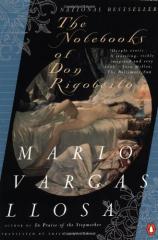The Notebooks of Don Rigoberto
About the Book
The Notebooks of Don Rigoberto
What is the value of art over ideology? How far can our quest for individual liberties take us? Can a man who collects—and burns—precious books and paintings be considered civilized? These are just some of the questions posed by the erudite and endlessly entertaining Peruvian author Mario Vargas Llosa in his two books about the life and marriage of Don Rigoberto.
A wealthy insurance executive, Don Rigoberto is a member of Lima's well-heeled bourgeois society—the kind of man one sees at board meetings and cocktail parties. But by night Don Rigoberto sheds his conventional skin to pursue his true passions: erotic art and sexual fantasy. In the privacy of his small library Don Rigoberto pores over a considerable collection of erotica that, by self-imposed dictum, must always consist of exactly four thousand volumes and one hundred canvases. Upon acquiring a new book or painting, he consigns an old one to the fireplace he has built as a "crematorium" for such abandoned works. In The Notebooks of Don Rigoberto, Vargas Llosa has chosen a rather shocking idiosyncrasy with which to introduce his hero. The book-burning, fantasy-spinning Don Rigoberto rails against anyone who would denounce his secretive passions; rotary club members, sports enthusiasts, feminists, animal-rights activists, and patriots are all dismissed as mindless adherents to a hoard mentality, and therefore deserving of Don Rigoberto's scorn. In fact, there are few people Don Rigoberto would consider worthy of his admiration. Among them are his beautiful—currently estranged—second wife, Lucrecia, and his precocious, cherubic teen-aged son, Alfonso. Both wife and son, it seems, possess Don Rigoberto's appetite for sensual pleasures. Unfortunately, they have found satisfaction for their cravings in each other's company—a fact that even a non-conventionalist like Don Rigoberto finds hard to digest.
As a literary figure, Don Rigoberto embodies several such contradictions. He is both scrupulously clean and remarkably ugly; he embraces personal freedom, yet has no tolerance for any art form or intellectual idea that opposes his tastes or beliefs. Most of all he is a formidable man who is also helplessly in love with his wife. Night after night Don Rigoberto professes his love for Lucrecia in a series of imagined erotic scenes in an attempt to duplicate the couple's nightly habit of sharing fantasies with each other. As the book progresses, Don Rigoberto's hunger for his wife intrudes into his fantasies—at times he is too debilitated by grief and desire to go on. Interspersed with these messages of longing are Don Rigoberto's diatribes against the world that would dare to condemn his passions and a series of intimate love letters reflecting the playful, sensuous relationship that the two lovers shared. Pulling together the novel's intellectually driven components is a narrative which concerns Alfonso's attempts to forge a reconciliation between Lucrecia and Don Rigoberto, the boy's own obsession with the erotic painter Egon Schiele, and his efforts to play out this obsession in a series of Schiele-inspired tableaux featuring the enticing Lucrecia.
Vargas Llosa's elaborate novel brilliantly combines elements of two disparate art forms. In alternating styles and themes he assembles the novel much like an abstract painter will "build" a canvas through color and composition. And like a classical symphony comprised of various movements, the novel gains force through the serial repetition of its components. Don Rigoberto is revealed as a man who is greater than the sum of his parts: art lover, fetishist, bureaucrat, libertarian, and, we grow to understand, vulnerable, hopeless romantic. Lucrecia is clearly a devoted wife who nonetheless rivals her husband in his passions and fantasies. Only Alfonso remains a cipher. At times bewitching and strangely endearing, at times almost malevolent in his ability to manipulate and seduce, this young boy of uncertain age has a power over the people around him. Is he a true innocent or a pathological schemer? How does he embody his father's beliefs in individual liberty? Vargas Llosa is cleverly ambiguous about the fate of the "happy triad." As in the previous adventures of the Rigoberto family, he leaves us wondering about the boundaries of personal freedom, the force of our erotic desires, and the power of art to inspire and motivate us to pursue our most beloved fantasies.
The Notebooks of Don Rigoberto
- Publication Date: July 1, 1999
- Mass Market Paperback: 272 pages
- Publisher: Penguin (Non-Classics)
- ISBN-10: 0140283595
- ISBN-13: 9780140283594










